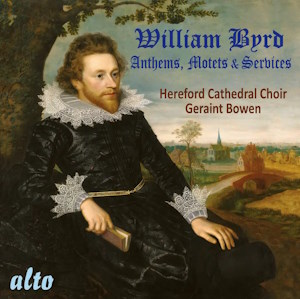
William Byrd (1543-1623)
Anthems, Motets, Services
The Choir of Hereford Cathedral/Geraint Bowen
Peter Dyke (organ)
rec. 2005, Hereford Cathedral, Hereford, UK
Alto ALC1486 [65]
Geraint Bowen has been organist and director of music at Hereford Cathedral since 2001. His assistant, Peter Dyke, has been in post even longer; he arrived in Hereford in 1998. Such long periods of service to the cathedral and its music – and also to the Three Choirs Festival – are hugely important in terms of the continuity and development of musical standards at Hereford Cathedral. This present disc was recorded relatively early in Bowen’s tenure – the sessions took place in January 2005 – and I presume that the recordings were previously issued by another label and have now been licenced to Alto.
Geraint Bowen’s programme principally includes items drawn from the two volumes of the Gradualia and the two collections entitled Cantiones sacrae. The programme is intelligently assembled so that energetic and more reflective pieces complement each other. Right from the very first item, Psallite Domino, certain characteristics of the performances and the way in which they have been recorded are apparent. Chief among these is the cathedral acoustic. My guess – and it is only a guess – is that the recordings were made in the quire. One is conscious at once of the resonance of the acoustic which acts as a warm halo round the music. Some may feel that the resonance is overdone at the expense of clarity; however, I’d argue that what we hear is a realistic reproduction of what one might expect to hear when music such as this is performed in a cathedral acoustic. True, there is a degree of compromise to be made in terms of clarity but, overall, I like the results. A second characteristic is the commitment and energy which the singers bring to the music. These pieces are meat and drink to a choir such as this and the performances sound well ‘run in’; clearly, Geraint Bowen had prepared his singers very well for this assignment. The treble section is quite prominent and thus the three lower parts are not aways ideally clear but, again, I find this representative of reality and I cannot but admire the degree of edge that the trebles have in their tone.
I enjoyed all the music and the way in which the pieces are performed. Let me mention a few highlights. I liked the slow, penitential air of Ne irascaris; Bowen shapes the music with great understanding and his choir sings very expressively, maintaining good lines throughout. By contrast, the singers then bring great energy to Laetentur Caeli, giving a suitably festive performance.
Justorum animae is a lovely, devotional piece and once again I admired the excellent control of line. Rorate coeli desuper is a vibrant composition to which the Hereford choir respond with committed, animated singing; in the middle section it sounds as if a reduced body of singers is deployed and those selected give a very good account of themselves. Ave verum corpus, which follows, is one of my favourite pieces by Byrd; Geraint Bowen leads a very fine account of this rapt music.
We don’t get too many opportunities to hear Peter Dyke in action since only Teach me, O Lord and the ‘Mag and Nunc’ from the Second Service require accompaniment. Dyke plays on a chamber organ, which in this context is much preferable to the main cathedral organ and his playing is both stylish and suitably discreet. Incidentally, in the booklet we’re told that a specification of the chamber organ can be found on the Alto website, but I couldn’t locate the information. Teach me, O Lord is, to be frank, not as interesting musically as most of the rest of the programme, but it’s well performed here. The Short Service is also well done, not least by the singers who are called upon to deliver the various short solos. I’m glad that the programme included examples of Byrd setting the Evening Canticles in both English (the Second Service) and in Latin (the Short Service).
I like the energy and attack which the choir, and the trebles in particular, bring to Exsurge, Domine. Energy is required again for Laudibus in sanctis. Bowen and his choir ensure that their performance of this excellent piece brings the programme to a dynamic and joyful conclusion.
This is a most enjoyable and nicely varied selection of pieces by Byrd. Anyone wanting a representative introduction to the sacred music of one of England’s greatest composers will find this a rewarding disc. I’ve commented on the recorded sound. The documentation is satisfactory: Timothy Symonds provides a useful introduction to the life and career of William Byrd; however, I think collectors who may not be well versed in this music would have been better served if specific comment about at least some of the pieces had been included.
John Quinn
Buying this recording via a link below generates revenue for MWI, which helps the site remain free


Contents
Psallite Domino (from Gradualia 1607)
Ne irascaris (from Cantiones sacrae 1589)
Laetentur caeli (from Cantiones sacrae 1589)
Senex puerum portabat (from Gradualia 1605)
Sing joyfully
Non vos relinquam (from Gradualia 1607)
Vigilate (from Cantiones sacrae 1589)
Justorum animae (from Gradualia 1605)
Haec dies (from Cantiones sacrae 1591)
Teach me, O Lord
Rorate coeli desuper (from Gradualia 1605)
Ave verum corpus (from Gradualia 1605)
Second Service: Magnificat
Second Service: Nunc dimittis
Exsurge, Domine (from Cantiones sacrae 1591)
Sacerdotes Domini (from Gradualia 1607)
Short Service: Magnificat
Short Service: Nunc dimittis
Laudibus in sanctis (from Cantiones sacrae 1591)

















